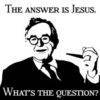Tag: Knowledge
Bosom of the Father Knowledge
No one has seen God at any time; the only begotten God who is in the bosom of the Father, He has explained Him. –John 1:18 Jesus has brought all who will, because He first willed for us, into the bosom of the Father in union with Him. It is here, this locale, where knowledge of God alone obtains. It is God’s Self-knowledge that He has invited us into, as if a banqueting table. The Christian, by the grace of God in Christ, shares in the divine nature; indeed, the particular nature of the particular and only living God. Without God’s revelation there would…
The Heavenly Dust: Christian Knowledge of God
As Christians we want to think about God as Christians. Christians, definitionally, aren’t profane persons. Indeed, according to Scripture, Christians are saints; i.e., set apart in Christ who is our Set Apart in the presence of the Father for us. This might seem scandalous to even recognize, but Christians are simply in a different place in regard to knowing reality as it is; insofar as the Christ (Jesus) allows us entrée in these, our bodies of death, in this in-between time. Some might want to push back and describe my observations as idealist. But it is just the opposite, in…
A Critical Theological Anthropology vis-à-vis a Knowledge of God against a Turn to the Subject
I put together the following some time ago, and only had it saved as a draft here on the blog. I thought I would publish it now. I actually don’t even recall who my interlocutor is anymore; maybe he’ll see this and remind me. I shared the following passage on Facebook and X, from John Baillie, as cited by TF Torrance in his book: Theological Science. The fact is that no true knowledge, no valid act of perceiving or thinking, can be explained by beginning from the human end—whether it be my perception of the number of peas in a…
The Vultures Have No Knowledge of God’s Kingdom: Living in the Theology of the Cross
for we walk by faith, not by sight . . .[1] It is certain that man must utterly despair of his own ability before he is prepared to receive the grace of Christ. That person does not deserve to be called a theologian who looks upon the »invisible« things of God as though they were clearly »perceptible in those things which have actually happened« (Rom. 1:20; cf. 1 Cor 1:21-25), he deserves to be called a theologian, however, who comprehends the visible and manifest things of God seen through suffering and the cross. A theology of glory calls evil good and good…
On Being a Real Protestant: Calvin and Barth against Thomas and the Thomists on a Vestigial Knowledge of God
Is God really knowable, secularly, in the vestiges of the created order? In other words, does God repose in the fallen order to the point that vain and profane people can come to have some type of vestigial knowledge of the living God? According to Thomas Aquinas, and other scholastics of similar ilk, the answer is a resounding: yes. Here is Thomas himself: as we have shown [q. 32, a. 1], the Trinity of persons cannot be demonstratively proven. But it is still congruous to place it in the light of some things which are more manifest to us. And…
On a Crucifixional ‘Certainty’ of Faith as Knowledge of God: With Reference to Herbert McCabe
Herbert McCabe on the certainty of the Christian reality (contra wishful thinking, so on and so forth): Now there are some people who will admit even this. They will admit that Christianity is reasonable even in this sense, that it is not merely logically coherent, but also a pretty reasonable hypothesis. They will admit that there is a lot of evidence of one kind and another to suggest that Christian beliefs are true, just as there is a lot of evidence of one kind and another to suggest that telepathy is quite common or that Queen Elizabeth I was in…
No Vision or Knowledge of God without God’s Holiness: The Role Christ’s Sanctification for Us Plays Towards Having Genuine Knowledge of God
Εἰρήνην διώκετε μετὰ πάντων, καὶ τὸν ἁγιασμόν, οὗ χωρὶς οὐδεὶς ὄψεται τὸν κύριον, Pursue peace with all people, and holiness, without which no one will see the Lord . . . Hebrews 12:14 ὄψεται (lexeme: ὁράω), translated in the NKJV above as ‘will see’ is in the future tense third person middle indicative. I have a theological-exegetical theory: P1. Divine holiness and peace are required in order to have vision and knowledge of God. P2. Knowledge and vision of God are eschatological realities available now and for eternity to come. P3. Only Jesus Christ for us has divine holiness and peace to…
Kataphysics. TFT’s ‘stratified knowledge of God’ and the Christian Existence
Either something is, or it isn’t. Surely, there are nuances on a continuum, and we should all be aware of that as we approach any system or maybe better, organism of thought. Nonetheless, in the end, either a framework of thought is sound and corresponds to reality or it doesn’t. This seems like a good working definition of critical realism. If we apply this to a theological prolegomenon, what, in the end, will obtain, is that we will use various criteria to determine whether or not some belief structure, that we may or may not adhere to, is actually true…
John Webster on a Pre-modern/precritical Confessional Knowledge of God V a Modern/critical Naturalist Knowledge of God
John Webster offers too good of a sketch on a theory of revelation for me to simply pass it by without sharing it for you (and I’ll be using it in my doctoral study as well—which my topic has changed already, I’ll share what it is in an addendum at the end of this post). He synopsizes what I have often been after in many of my posts on the same locus. Let’s read along with him, and then I’ll close with some concluding reflections (and that addendum). The broadest outline of a diagnosis would be something like this: For…
Knowledge of God: Irruptive Rather Than Domestic
I think sometimes folks aren’t appreciating the rub between what Barth (Torrance et al.) are doing when they offer an alternative—to classical theism—theory knowledge of God. It orbits around a question; a question Keith Johnson articulates with great clarity: Romans I Barth began concentrated study on Paul’s Epistle to the Romans a few months after delivering ‘The Righteousness of God’. The experience was slow-going, at least by the standards of his later output. The extra time spent on the manuscript, however, meant that Barth’s understanding of the distinctions and categories that had been working subtly throughout ‘The Righteousness of God’ had time…





